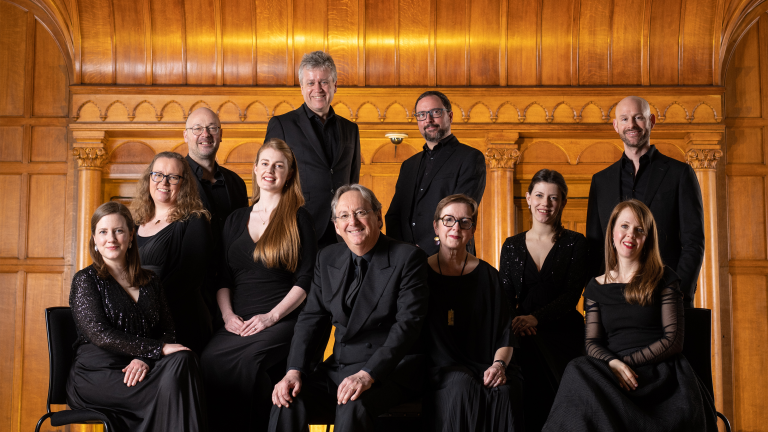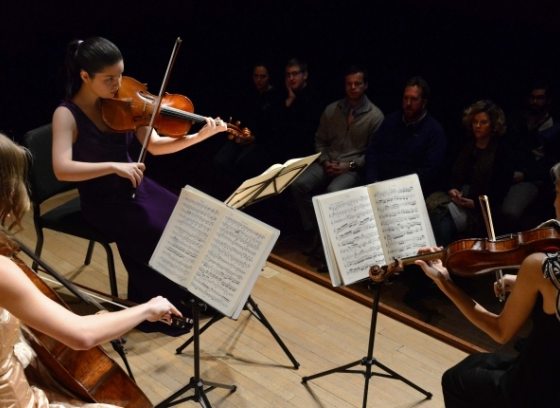
Longwood Debut
Renowned for their clarity of sound, three-time Grammy-nominated musical group The Tallis Scholars—who have established themselves as the leading exponent of Renaissance sacred music—perform their Glorious Creatures program, formed around how nature beautifies our lives, from the sun in the sky to the flowers that grow in gardens.
Through good tuning and blend—and the purity and clarity of sound which serves the Renaissance repertoire—The Tallis Scholars allow every detail of the musical lines to be heard. It is the resulting beauty of sound for which The Tallis Scholars have become so widely renowned—performing in both sacred and secular venues, and giving around 80 concerts each year for more than 50 years.
For their Glorious Creatures program, The Tallis Scholars focus on the beauty and role of nature in our lives and, by extension, “the grapes that make the vinum bonum we enjoy.” The title is taken from a new setting of words by Thomas Traherne, commissioned by the Tallis Scholars from Nico Muhly. Some of these pieces (like de Rore's Descendi in hortum meum) involve canon, which is the musical equivalent of the kind of artifice we may associate with horticulture. To draw both strands together, we end with a grandly canonic setting of the Magnificat by the Spanish master Sebastián de Vivanco, whose setting of a text from the Song of Songs opens the program.
The Tallis Scholars were founded in 1973 by their director, Peter Phillips. In 2013 the group celebrated their 40th anniversary with a world tour, performing 99 events in 80 venues in 16 countries. In 2020 Gimell Records celebrated 40 years of recording the group by releasing a remastered version of the 1980 recording of Allegri’s Miserere.
As they celebrate their 50th birthday, the desire to hear this group in all corners of the globe is as strong as ever. They have now performed well over 2,500 concerts, with 2023-24 season highlights including performances in Japan, the US, Paris, Dresden, Ravenna, and Helsinki; a number of appearances in London; and their usual touring schedule in Europe and the UK.
In a monumental project to mark Josquin des Prez’ 500th anniversary, The Tallis Scholars sang all 18 of the composer’s masses over the course of four days at the Boulez Saal in Berlin in July 2022, only to repeat this feat in Utrecht in summer 2023.
Recordings by The Tallis Scholars have attracted many awards throughout the world. In 1987 their recording of Josquin's Missa La sol fa re mi and Missa Pange lingua received Gramophone magazine’s Record of the Year award, the first recording of early music ever to win this coveted award. In 1989 the French magazine Diapason gave two of its Diapason d'Or de l'Année awards for the recordings of a mass and motets by Lassus and for Josquin's two masses based on the chanson L'Homme armé. Their recording of Palestrina's Missa Assumpta est Maria and Missa Sicut lilium was awarded Gramophone's Early Music Award in 1991; they received the 1994 Early Music Award for their recording of music by Cipriano de Rore; and the same distinction again in 2005 for their disc of music by John Browne.
The Tallis Scholars were nominated for Grammy Awards in 2001, 2009, and 2010. In November 2012 their recording of Josquin's Missa De beata virgine and Missa Ave maris stella received a Diapason d’Or de l’Année and in their 40th anniversary year they were welcomed into the Gramophone Hall of Fame by public vote. In a departure for the group in spring 2015, The Tallis Scholars released a disc of music by Arvo Pärt called Tintinnabuli, which received great praise across the board. A 2020 release including Missa Hercules Dux Ferrarie was the last of nine albums in The Tallis Scholars’ project to record and release all Josquin's masses before the 500th anniversary of the composer’s death. It was the winner of the BBC Music Magazine’s much coveted Recording of the Year Award in 2021 and the 2021 Gramophone Early Music Award. Their latest Gimell release in October 2023 is of music by John Sheppard.
